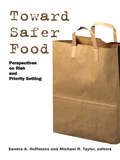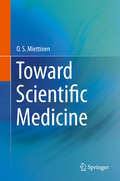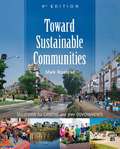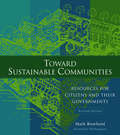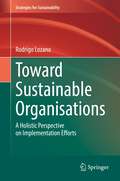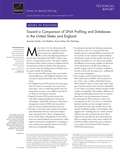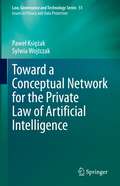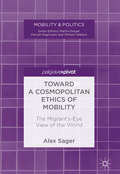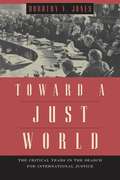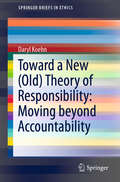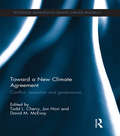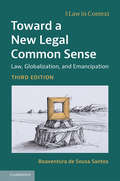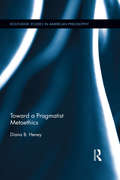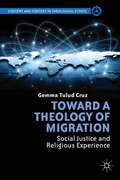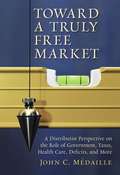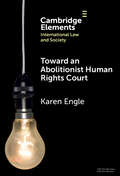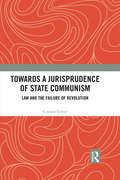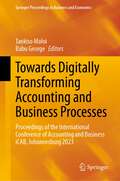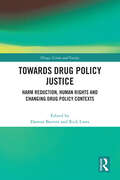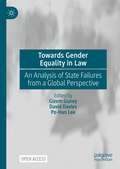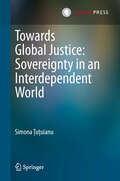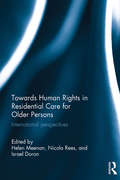- Table View
- List View
Toward Safer Food: Perspectives on Risk and Priority Setting
by Sandra Professor Hoffmann Michael R. TaylorIn 1998, a National Academy of Sciences panel called for an integrated, risk-based food safety system. This goal is widely embraced, but there has been little advance in thinking about how to integrate knowledge about food safety risks into a system- wide risk analysis framework. Such a framework is the essential scientific basis for better priority setting and resource allocation to improve food safety. Sandra Hoffmann and Michael Taylor bring together leading scientists, risk analysts, and economists, as well as experienced regulators and policy analysts, to better define the priority setting problem and focus on the scientific and intellectual resources available to construct a risk analysis framework for improving food safety. Toward Safer Food provides a common starting point for discussions about how to construct this framework. The book includes a multi-disciplinary introduction to the existing data, research, and methodological and conceptual approaches on which a system-wide risk analysis framework must draw. It also recognizes that efforts to improve food safety will be influenced by the current institutional context, and provides an overview of the ways in which food safety law and administration affect priority setting. Hoffman and Taylor intend their book to be accessible to people from a wide variety of backgrounds. At the same time, they retain the core conceptual sophistication needed to understand the challenges that are inherent in improving food safety. The editors hope that this book will help the U.S. move beyond a call for an integrated, risk-based system toward its actual construction.
Toward Scientific Medicine
by O. S. MiettinenScientific medicine in Miettinen's conception of it is very different from the two ideas about it that come to eminence in the 20th century. To him, medicine is scientific to the extent that it has a rational theoretical framework and a knowledge-base from medical science. He delineates the nature of that theoretical framework and of the research to develop the requisite knowledge for application in such a framework. The knowledge ultimately needed is about diagnostic, etiognostic, and prognostic probabilities, and it necessarily is to be codified in the form of probability functions, embedded in practice-guiding expert systems. In these terms, today's medicine still is mostly pre-scientific, and major innovations are needed within and around medicine for healthcare to get to be in tune with reasonable expectations about it in this Information Age. Thus, while the leading cause of litigation for medical malpractice in the U. S. is failure to expeditiously and correctly diagnose the probability of myocardial infarction in a hospital's emergency room, this book shows that a typical modern textbook of cardiology, just as one of medicine at large, imparts no knowledge about the diagnostic probabilities needed in this, and that the prevailing type of diagnostic research will not produce the requisite knowledge. If the diagnostic pursuits in an ER would be guided by an emergency-room diagnostic expert system, this would guarantee expert diagnoses by all ER doctors. Academic leaders of medicine and medical researchers concerned to advance the knowledge-base of medicine will find a wealth of stimulus for thinking about the deficiencies of the prevailing knowledge culture in and surrounding medicine, and about the directions of the needed progress toward genuinely scientific medicine.
Toward Sustainable Communities
by Mark RoselandThe need to make our communities sustainable is more urgent than ever before. Toward Sustainable Communities remains the single most useful resource for creating vibrant, healthy, equitable, economically viable places. This comprehensive update of the classic text presents a leading-edge overview of sustainability in a new fully illustrated, full-color format.Compelling new case studies and expanded treatment of sustainability in rural as well as urban settings are complemented by contributions from a range of experts around the world, demonstrating how "community capital" can be leveraged to meet the needs of cities and towns for:*Energy efficiency, waste reduction, and recycling*Water, sewage, transportation, and housing*Climate change and air quality*Land use and urban planning.Fully supported by a complete suite of online resources and tools, Toward Sustainable Communities is packed with concrete, innovative solutions to a host of municipal challenges. Required reading for policymakers, educators, social enterprises, and engaged citizens, this "living book" will appeal to anyone concerned about community sustainability and a livable future.Mark Roseland is director of the Centre for Sustainable Community Development at Simon Fraser University and professor at SFU's School of Resource and Environmental Management. He lectures internationally, advises communities and governments on sustainable development policy and planning, and has been cited as one of British Columbia's "top fifty living public intellectuals."
Toward Sustainable Communities
by Stacy Mitchell Mark RoselandLocal governments are increasingly caught between rising expectations that development initiatives be sustainable and the fact that more and more services are being downloaded to the municipal level. The third edition of this classic text offers practical suggestions and innovative solutions to a range of community problems---including energy efficiency, transportation, land use, housing, waste reduction, recycling, air quality and governance. In clear language, with updated tools, initiatives and resources, a new preface and foreword, this sustainable practices resource is for both citizens and governments.Mark Roseland is director of the Centre for Sustainable Community Development at Simon Fraser University in British Columbia. He lectures internationally and advises communities and governments.
Toward Sustainable Organisations: A Holistic Perspective on Implementation Efforts (Strategies for Sustainability)
by Rodrigo LozanoThe book is one of the first ones focussing on how organisations (civil society, corporations, and public sector ones) are contributing to sustainability. The book starts by providing a discussion of the four dimensions of sustainability (economic, environmental, social, and time). The second chapter focusses on what organisations are, their system elements (e.g. operations and production, management and strategy, and governance), stakeholders, relationships within and between organisations (ranging from competition to collaboration), and a framework for organisations to understand and map how they can contribute to sustainability. The third chapter discusses the twenty-four main tools, initiatives, and approaches (TIAs) that have been developed for organisations to contribute to sustainability, such as Circular Economy, Corporate Social Responsibility, Environmental Management Systems, and Sustainability Reporting. The fourth chapter focusses on organisational change management for sustainability, including types of change, drivers for change, resistance to change, incorporation, and institutionalisation. The fifth chapter presents empirical evidence on what civil society organisations have contributed to sustainability, from priorities and impacts, TIAs, external stimuli, and internal factors, drivers for change, starts of change, and development of change. The sixth chapter presents empirical evidence on what corporations have contributed to sustainability, from priorities and impacts, TIAs, external stimuli, and internal factors, drivers for change, starts of change, and development of change. The seventh chapter presents empirical evidence on what public sector organisations have contributed to sustainability, from priorities and impacts, TIAs, external stimuli, and internal factors, drivers for change, starts of change, and development of change. The last chapter provides the conclusions of the book.The book is aimed at providing a multi-level, dynamic, and holistic perspective on the contributions of organisations to sustainability. The book's uniqueness lies in analysing organisations’ efforts to become more sustainability oriented and contribute to making societies more sustainable through systems thinking, TIAs, and change processes.
Toward a Comparison of DNA Profiling and Databases in the United States and England
by Carl Matthies Paul Steinberg Emma Disley Jeremiah GoulkaRAND researchers explored the U.S. and English forensic DNA analysis systems to find out whether England has capitalized more fully on their crime-fighting potential than the U.S. system, processing samples more quickly and providing more database hits for law enforcement.
Toward a Conceptual Network for the Private Law of Artificial Intelligence (Law, Governance and Technology Series #51)
by Paweł Księżak Sylwia WojtczakThis book provides a set of proposals for the new conceptual network required in order to establish civil law rules for a world permeated by Artificial Intelligence. These proposals are intended by their authors to push the debate on the new civil law forward. In spite of the natural conservatism of jurists, some innovative or even futuristic ideas are called for, also because the future, even this not-so-distant one, is difficult to foresee. Paradoxically, and unlike in the past, this lack of knowledge must not stop us from planning. If it does, humankind may, as some pessimists already claim, lose its chance to win the battle for control of the world.The rise and expansion of Artificial Intelligence and robotics in recent years has highlighted a pressing need to create a suitable legal framework for this new phenomenon. The debate on the subject, although wide-ranging and involving many new legal documents, is still quite general and preliminary in nature, although these preparatory works illustrate the very real need to develop appropriate new civil law arrangements. It is exactly the branch of private law where the necessity of these new rules appears to be the most imperative. Autonomous vehicles, medical robots, and expertise software raise fundamental questions on aspects of civil liability such as culpability; whereas the growth in popularity of automated, intelligent software systems for concluding contracts requires a new approach to many fundamental and deeply rooted elements of contract law, e.g. consciousness, intent, error, deception, interpretation of contracts and good faith. Ruling on these specific matters demands the identification and clarification of certain key points, which shall become the foundation for constructing AI/robot civil law.
Toward a Cosmopolitan Ethics of Mobility: The Migrant's-Eye View of the World (Mobility & Politics)
by Alex SagerThis book proposes a cosmopolitan ethics that calls for analyzing how economic and political structures limit opportunities for different groups, distinguished by gender, race, and class. The author explores the implications of criticisms from the social sciences of Eurocentrism and of methodological nationalism for normative theories of mobility. These criticisms lend support to a cosmopolitan social science that rejects a principled distinction between international mobility and mobility within states and cities. This work has interdisciplinary appeal, integrating the social sciences, political philosophy, and political theory.
Toward a Cultural Politics of Climate Change: Devices, Desires and Dissent
by Johannes Stripple Harriet Bulkeley Matthew PatersonTowards a Cultural Politics of Climate Change provides a new perspective on how climate change matters in policy-making, business and everyday life. It argues that the work of low carbon transitions takes place through the creation of devices, the mobilisation of desires, and the articulation of dissent. Using case studies from the US, Australia, and Europe, the book examines the creation and contestation of new forms of cultural politics - of how a climate-changed society is articulated, realized and contested. Through this approach it opens up questions about how, where and by whom climate politics is conducted and the ways in which we might respond differently to this societal challenge. This book provides a key reference point for the emerging academic community working on the cultural politics of climate change, and a means through which to engage this new area of research with the broader social sciences. Develops a new framework for analyzing the cultural politics of climate change, providing readers with a new perspective that bridges accounts of cultural responses to climate change and those which focus on its politics. Includes a range of international case studies which demonstrate the ways in which responses to climate change are being realized in everyday life, giving readers concrete examples from familiar areas of social and political life through which to interpret the new perspective. Provides a new approach to thinking about how climate change comes to matter in everyday life, for those seeking to look beyond 'individualist' approaches to understanding how society is responding to climate change.
Toward a Feminist Ethics of Nonviolence
by Judith Butler Bonnie Honig Adriana CavareroToward a Feminist Ethics of Nonviolence brings together major feminist thinkers to debate Cavarero’s call for a postural ethics of nonviolence and a sociality rooted in bodily interdependence.Toward a Feminist Ethics of Nonviolence brings together three major feminist thinkers—Adriana Cavarero, Judith Butler, and Bonnie Honig—to debate Cavarero’s call for a postural ethics of nonviolence. The book consists of three longer essays by Cavarero, Butler, and Honig, followed by shorter responses by a range of scholars that widen the dialogue, drawing on post-Marxism, Italian feminism, queer theory, and lesbian and gay politics. Together, the authors contest the boundaries of their common project for a pluralistic, heterogeneous, but urgent feminist ethics of nonviolence.
Toward a Just World: The Critical Years in the Search for International Justice
by Dorothy V. Jones"Toward a Just World is an insightful and thoughtful history. The first half of the twentieth century and the heroic efforts of those who sought international justice during that time will be much better understood and appreciated thanks to this fascinating book. "—Robert F. Drinan, Georgetown University A century ago, there was no such thing as international justice, and until recently, the idea of permanent international courts and formal war crimes tribunals would have been almost unthinkable. Yet now we depend on institutions such as these to air and punish crimes against humanity, as we have seen in the International Criminal Tribunal for Rwanda and the appearance of Serbian leader Slobodan Milosevic before the Tribunal for the Former Yugoslavia. Toward a Just World tells the remarkable story of the long struggle to craft the concept of international justice that we have today. Dorothy V. Jones focuses on the first half of the twentieth century, the pivotal years in which justice took on expanded meaning in conjunction with ideas like world peace, human rights, and international law. Fashioning both political and legal history into a compelling narrative, Jones recovers little-known events from undeserved obscurity and helps us see with new eyes the pivotal ones that we think we know. Jones also covers many of the milestones in the history of diplomacy, from the Treaty of Versailles and the creation of the League of Nations to the Nuremberg war crimes tribunal and the making of the United Nations. As newspapers continue to fill their front pages with stories about how to administer justice to al Qaeda and Saddam Hussein, Toward a Just World will serve as a timely reminder of how the twentieth century achieved one of its most enduring triumphs: giving justice an international meaning.
Toward a New (SpringerBriefs in Ethics)
by Daryl KoehnThis book offers a much needed overview of the neglected notion of responsibility. Instead of offering vague talk about “individual responsibility” or “corporate responsibility,” Daryl Koehn examines in detail four accounts of responsibility, taking care to specify what responsibility does and does not mean in each account. She argues for a return to the ancient concept of Socratic dialogical responsibility, a concept that avoids many of the problems inherent in the other accounts. After examining the Anglo-American criminal legal system’s treatment of responsibility as intentional agency, she critiques Hans Jonas’s concept of responsibility as ontological care and Hannah Arendt’s notion of communicative responsibility. She provides a careful analysis of the strengths and weaknesses of each approach to responsibility. The final chapter makes the case for Socratic dialogical responsibility. Dialogical responsibility has many strengths in its own right and avoids the major pitfalls of the other notions of responsibility examined in the book. It serves as an eminently practical way to hold ourselves responsible for our actions and speech. In addition, dialogical responsibility alone qualifies as a virtue integral to the good life.
Toward a New Climate Agreement: Conflict, Resolution and Governance (Routledge Advances in Climate Change Research)
by Jon Hovi David M. McEvoy Todd L. CherryClimate change is one of the most pressing problems facing the global community. Although most states agree that climate change is occurring and is at least partly the result of humans’ reliance on fossil fuels, managing a changing global climate is a formidable challenge. Underlying this challenge is the fact that states are sovereign, governed by their own laws and regulations. Sovereignty requires that states address global problems such as climate change on a voluntary basis, by negotiating international agreements. Despite a consensus on the need for global action, many questions remain concerning how a meaningful international climate agreement can be realized. This book brings together leading experts to speak to such questions and to offer promising ideas for the path toward a new climate agreement. Organized in three main parts, it examines the potential for meaningful climate cooperation. Part 1 explores sources of conflict that lead to barriers to an effective climate agreement. Part 2 investigates how different processes influence states’ prospects of resolving their differences and of reaching a climate agreement that is more effective than the current Kyoto Protocol. Finally, part 3 focuses on governance issues, including lessons learned from existing institutional structures. The book is unique in that it brings together the voices of experts from many disciplines, such as economics, political science, international law, and natural science. The authors are academics, practitioners, consultants and advisors. Contributions draw on a variety of methods, and include both theoretical and empirical studies. The book should be of interest to scholars and graduate students in the fields of economics, political science, environmental law, natural resources, earth sciences, sustainability, and many others. It is directly relevant for policy makers, stakeholders and climate change negotiators, offering insights into the role of uncertainty, fairness, policy linkage, burden sharing and alternative institutional designs.
Toward a New Legal Common Sense: Law, Globalization, and Emancipation (Law in Context)
by Boaventura de Sousa SantosParadigmatic transition is the idea that ours is a time of transition between the paradigm of modernity, which seems to have exhausted its regenerating capacities, and another, emergent time, of which so far we have seen only signs. Modernity as an ambitious and revolutionary sociocultural paradigm based on a dynamic tension between social regulation and social emancipation, the prevalent dynamic in the sixteenth century, has by the twenty-first century tilted in favour of regulation, to the determent of emancipation. The collapse of emancipation into regulation, and hence the impossibility of thinking about social emancipation consistently, symbolizes the exhaustion of the paradigm of modernity. At the same time, it signals the emergence of a new paradigm or new paradigms. This updated 2020 edition is written for students taking law and globalization courses, and political science, philosophy and sociology students doing optional subjects.
Toward a Pragmatist Metaethics (Routledge Studies in American Philosophy)
by Diana HeneyIn our current social landscape, moral questions—about economic disparity, disadvantaging biases, and scarcity—are rightly receiving attention with a sense of urgency. This book argues that classical pragmatism offers a compelling and useful account of our engagement with moral life. The key arguments are first, that a broader reading of the pragmatist tradition than is usually attempted within the context of ethical theory is necessary; and second, that this broad reading offers resources that enable us to move forward in contemporary debates about truth and principles in moral life. The first argument is made by demonstrating that there is an arc of theoretical unity that stretches from two key founders of pragmatism—Charles Sanders Peirce and William James—through the work of John Dewey and Clarence Irving Lewis. The second argument is made by engaging with contemporary debates concerning the truth-status of the judgments and assertions made in ordinary moral discourse, as well as the role and nature of moral principles. Toward a Pragmatist Metaethics will be of interest to scholars of American philosophy, American intellectual history, and moral and political theorists, as well as anyone interested in the contours and demands of shared moral discourse.
Toward a Theology of Migration
by Gemma Tulud CruzAt no other time in the history of the world is the movement of people at such a large scale that scholars consider the current period as the age of migration. Beyond the density, velocity, and multi-directionality, however, the often conflicting and tragic nature of contemporary global migration makes a compelling case for theological reflection. The book explores the problems and possibilities that the experience of migrants brings to Christian theology by reflecting on the religious dimension as well as the social justice implications of the migrant experience. More specifically, the book reflects on the Christian vision of 'one bread, one body, one people' in view of the gifts and challenges of contemporary global migration to Christian systematic theology, social ethics, spirituality, mission, ministry, and inculturation based on the experience of refugees, unauthorized poor migrants, migrant workers, and migrant women.
Toward a Truly Free Market: A Distributist Perspective on the Role of Government, Taxes, Health Care, Deficits, and More
by John C. MedailleToward a Truly Free Market argues that any attempt to divorce economic equilibrium from economic equity will lead to an unbalanced economy--one that falls either to ruin or to ruinous government attempts to redress the balance.
Toward an Abolitionist Human Rights Court: Rethinking Responses to Gendered and Racialized Violence (Elements in International Law and Society)
by Karen EngleContemporary international human rights law increasingly obligates states to heighten their criminalization of certain human rights violations, including gendered, racialized, and homophobic violence. This Element uses prison and police abolitionist thought to challenge this trend. It focuses on the European Court of Human Rights (ECtHR), arguing that the Court's reliance on punishment and policing threatens to undo earlier European approaches to criminal law and human rights that resonate with abolitionist thought. It also contends that the criminalization approach provides the Court with an alibi for not recognizing or attending to the deeply structural racialized, colonial, sexual, gendered, and homophobic violence in Europe, particularly but not only against Roma communities and Black and Muslim migrants. Encouraging human rights advocates and judges to take seriously prison and police abolition in Europe and elsewhere, the Element calls for the ECtHR to pave the way for an abolitionist-oriented turn among human rights courts.
Toward an Informal Account of Legal Interpretation
by Allan C. HutchinsonToward an Informal Account of Legal Interpretation offers a viable account of law, judicial decision-making, and legal interpretation that is as fresh as it is familiar. The author expertly challenges the dominant mode of formalist theorizing and proposes an explanatory account of legal interpretation that can profitably be understood as an 'informal' intervention. Such an informal approach has no truck with either the claims of the formalists (i. e. , that law is something separate from ideology) or those of the anti-formalists (i. e. , that law is nothing other than ideological posturing). Hutchinson insists that, when understood properly, legal interpretation is an applied exercise in law-and-ideology; it is both constrained and unconstrained in equal measure. In developing this informalist account through a sustained application of the 'no vehicles in the park' rule, this book is wide-ranging in theoretical scope and substance, but also accessible and practical in style.
Towards A Jurisprudence of State Communism: Law and the Failure of Revolution
by Cosmin CercelMore than twenty-five years after the collapse of the Socialist bloc, the nature of the regimes in Eastern Europe between 1945 and 1989 continues to evade the attempts of political theorists and scholars of post-communism to define and classify them. Drawing on philosophical inquiry, jurisprudential analysis and intellectual history, this book traces the impact of communist ideology and practice on legal thought: from its critical roots in the midst of the nineteenth century to its reactionary stand in the later years of the twentieth. Exploring how the communist experience – both in its revolutionary and authoritarian guises – has been articulated within the legal theoretical field, the book addresses two central theoretical lacunae fostered by the historiography of authoritarianism in Central and Eastern Europe: the status of law, and its relationship to the broader ideological framework legitimising authoritarian regimes. Moving beyond the limits of the contemporary discourse on communism – particularly as it is channelled through transitional justice and memory studies – Cosmin Cercel develops a theoretical framework that is able to uncover law’s complicity with the extreme ideologies that dominated Central and Eastern Europe. For it is, he argues, in its recourse to legal concepts that the communist experience raises important jurisprudential questions for our contemporary understanding of law, the limits of state sovereignty, and law’s relationship to historical violence.
Towards Digitally Transforming Accounting and Business Processes: Proceedings of the International Conference of Accounting and Business iCAB, Johannesburg 2023 (Springer Proceedings in Business and Economics)
by Babu George Tankiso MoloiThis conference volume discusses the findings of the iCAB 2023 conference that took place in Johannesburg, South Africa. The University of Johannesburg (UJ School of Accounting and Johannesburg Business School) in collaboration with Alcorn State University (USA), Salem State University (USA) and Universiti Teknologi Mara (Malaysia) hosted the iCAB 2023 conference with the aim to bring together researchers from different Accounting and Business Management fields to share ideas and discuss how new disruptive technological developments are impacting the field of accounting. The conference was sponsored by the Association of International Certified Professional Accountants AICPA & CIMA.
Towards Drug Policy Justice: Harm Reduction, Human Rights and Changing Drug Policy Contexts (Drugs, Crime and Society)
by Rick Lines Barrett, Edited by DamonTaking the shifting global drug policy terrain as a starting point, this collection moves beyond debates about whether to reform drug policies to a focus on delivering ‘drug policy justice’ – repairing the damage caused by the war on drugs as a component of reform efforts and safeguarding against future harms in legal markets. This book brings together some of the leading international thinkers and advocates on harm reduction and drug policy to introduce key questions in contemporary drug policy. Across five themes, and with contributions from different regions and disciplines, it explores ethical, legal, empirical and historical perspectives on delivering ‘drug policy justice’ from supply through to use. Essays cover a wide range of issues, from the effects of COVID on drug policy to securing economic and environmental justice, and from human rights in Asian drug policy to questions of race and equity in cannabis reforms, providing diverse insights on both prominent and overlooked drug policy challenges. Towards Drug Policy Justice is a benchmark text for scholars, students, advocates and policymakers as the book explores new models of global drug policy reform.
Towards Gender Equality in Law: An Analysis of State Failures from a Global Perspective
by David Davies Gizem Guney Po-Han LeeThis Open Access book aims to find out how and why states in various regions and of diverse cultural backgrounds fail in their gender equality laws and policies. In doing this, the book maps out states’ failures in their legal systems and unpacks the clashes between different levels and forms of law—namely domestic laws, local regulations, or the implementation of international law, individually or in combination. By taking off from the confirmation that the concept of law that is to be used in achieving gender equality is a multidimensional, multi-layered, and to an extent, contradictory phenomenon, this book aims to find out how different layers of laws interact and how they impact gender equality. Further to that, by including different states and jurisdictions into its analysis, this book unravels whether there are any similarities/patterns in how these states define and utilise policies and laws that harm gender equality. In this way, the book contributes to the efforts to devise holistic and universal policies to address various forms of gender inequalities across the world. This volume will be of interest to scholars and students in Gender Studies, Sociology, Law, and Criminology.
Towards Global Justice: Sovereignty in an Interdependent World
by Simona ŢuţuianuWith Forewords by Geoffrey Robertson QC, Doughty Street Chambers, London, UK and Professor Mihail E. Ionescu, Bucharest, Romania Simona Ţuţuianu describes a new model of sovereignty which is fast replacing the traditional Westphalian model embodied in Article 2 of the UN Charter and rigorously followed throughout the Cold War. The scholarly basis for this new model draws upon developments in international criminal law which first emerged from the Nuremberg trials and upon more recent interstate economic cooperation which has turned sovereign independence into interdependence across a range of state functions. Does this mean that traditional Westphalian concepts of sovereignty should be abandoned in constructing a new theory of world governance for the twenty-first century? Not at all. A new model, which can be called the pattern of interdependence-based sovereignty, serves to explain contemporary events that puzzle traditional theorists, such as the war over Kosovo, the invasions of Iraq and Libya, the emergence of a "Responsibility to protect" doctrine and its recent validation in Security Council Resolutions 1970 and 1973. We are witnessing the emergence of a new philosophy of action, which is in the process of producing a 21st century system of international relations. The Book will appeal to academics, students and postgraduates studying international affairs, politics, international law, diplomatic history, or war and/or peace studies. It is particularly of interest for NATO establishments and national military schools, while experts and scholars will value its theory of what sovereignty means today. The Book offers a multidisciplinary approach which underpins a new theory of how human rights can be better protected in a better world. There is a unique case study of cooperative security in the Greater Black Sea Area, by one of the few experts on the politics of this region. It will be read and appreciated by those who need to understand how modern international law and diplomacy really work. Journalists, media commentators, human rights NGOs, aid agencies, diplomats and government officials need the information in this Book.
Towards Human Rights in Residential Care for Older Persons: International Perspectives (Routledge Research in Human Rights Law)
by Israel Doron Helen Meenan Nicola ReesPeople are leading significantly longer lives than previous generations did, and the proportion of older people in the population is growing. Residential care for older people will become increasingly necessary as our society ages and, we will require more of it. At this moment in time, the rights of older people receive attention at international and regional levels, with the United Nations, the Organization of American States and the African Union exploring the possibility of establishing new conventions for the rights of older persons. This book explores the rights of older people and their quality of care once they are living in a care home, and considers how we can commence the journey towards a human rights framework to ensure decent and dignified care for older people. The book takes a comparative approach to present and future challenges facing the care home sector for older people in Africa (Kenya), the Arab world (Egypt), Australia, China, England, Israel, Japan and the USA. An international panel of experts have contributed chapters, identifying how their particular society cares for its older and oldest people, the extent to which demographic and economic change has placed their system under pressure and the role that residential elder care homes play in their culture. The book also explores the extent to which constitutional or other rights form a foundation to the regulatory and legislative structures to residential elder care and it examines the important concept of dignity. As a multi-regional study of the care of older person from a human rights perspective, this book will be of excellent use and interest, in particular to students and researchers of family and welfare law, long-term care, social policy, social work, human rights and elder law.
